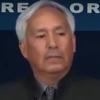Former Senator Proposes a DeMinted Constitutional Convention
Democracy in Crisis

Photo Credit: Taylor Henry
In the early years of the Obama era, then-Sen. Jim DeMint embodied a series of contradictions in the American character. The hard-jawed and bitter-faced Sandlapper was simultaneously a theocrat, a cynic and a salesman. What he sold, as salvation, was hate and fear. He realized before the rest of us that it does not matter what politicians say or do as long as they can demonize their enemies, turning them into villains that the American people can love to hate.
DeMint came from the fundamentalist mill town of Greenville, SC. BMW and Michelin have recently turned the town into a somewhat more cosmopolitan place. But even 20 years ago—when I finally escaped—it was a town that produced dire, dour and yet grimly visionary people; a severe, joyless place whose preachers obsessed over hellfire and the enjoyable things other people may be doing to hasten it.
DeMint galvanized the Tea Party with this schtick, but he could only take it so far. It was a little too grim for the American Sucker. DeMint played the part like a great character actor—Harry Dean Stanton playing Ronald Reagan.
Trump came along and brought a little P.T. Barnum to the act, taking DeMint’s gruesome view of America at war with itself and carnival-izing the carnage, in the same way televangelists like Jimmy Swaggart made the hellfire sermons they heard in small Southern churches palatable to the masses on television.
“The bigger government gets, the smaller God gets,” DeMint said in a radio appearance in 2011. Trump echoed this in May when he told a crowd at the fundamentalist Liberty University, “In America, we don’t worship government, we worship God.”
Perhaps DeMint was savvy enough to know he would do better as a vicar or an éminence grise, providing ideas to the crown, rather than the frontman. He left the Senate in 2012 to take over the ultra-conservative think tank The Heritage Foundation.
During the election, the foundation remained largely silent on Trump, putting DeMint in a perfect position to help guide the seemingly shocked and ill-prepared transition team. It provided policy papers, personnel and a list of Supreme Court nominees, deeply influencing the beginning of the Trump era. So it was a shocker—and sort of admirable—when the Heritage board ousted DeMint in May, with influential members arguing he had dulled the intellectual edge of the foundation by making it too activist.
After his Heritage ouster, the former senator went to work for the Convention of States Project. This is a group that wants to invoke Article V of the Constitution to call for a convention to amend the constitution.
Article V outlines two ways to add an amendment to the Constitution; one of them has never been successfully employed before. Each of the 27 existing amendments has been proposed by two-thirds of both houses of Congress and ratified by three-fourths of the states. In the other way, two-thirds of the legislatures of the states can “call a convention for proposing amendments.”
The conventional way is politically impossible at present and, to a man like DeMint, undesirable. But the alternate way—relying on the states—is almost too perfect an ideological vehicle. DeMint calls the Convention of States the next stage of the tea party, which wanted to limit federal power. It makes ideological sense for him to latch onto state legislatures’ ability to change the constitution to limit federal power.
The crazy thing is that it might actually be possible. Thirty-four is two-thirds of 50. That’s how many state legislatures would have to request a convention. Republicans hold both houses in 32 states. If a convention relying on state legislatures would ever work for the right, it would be now. Twelve states have already requested a convention to amend the Constitution. Over the last few weeks, DeMint was lobbying hard in North Carolina to make it the 13th.
One of the big problems is the possibility of a “runaway convention.” The Convention of States argues that such a convention could be limited to a single topic: limiting federal control. But because it has never happened, no one knows how it will go. Imagine the Proud Boys and Antifa outside the convention hall.
The one topic DeMint and his crew want to introduce is the limit of federal control, including congressional and Supreme Court term limits; a balanced budget; and the elimination of federal regulations. While it seems like such a focus may be opposed to the Trump regime, it fits in perfectly with its stated goal of the “deconstruction of the administrative state,” as Steve Bannon put it.
Trump’s new voter commission—headed up by Kris Kobach, a Kansas extremist who is the perfect DeMint counterpart—might make the possibility of a new states-driven, conservative-leaning constitutional convention even more likely. The state-level dominance Republicans presently enjoy is due in part to successful attempts to limit the votes of minorities and others they think might vote Democrat. (The pusillanimous posturing of the Democrats doesn’t help.) If they are further able to control the turnout, Republicans will be more likely to gain even more states, increasing the likelihood of a constitutional convention.
The contradiction gives yet another glimpse into today’s so-called conservative movement. The Trump/Kobach commission requires states to give voter data to the federal government (although many have refused). But just as fellow states’ rights Southerner Attorney General Jeff Sessions rejects states’ decisions to legalize cannabis and favors big-government mandatory minimum sentencing, the people who want to strip power from the federal government are perfectly happy to allow the Feds to strip the vote from citizens to do so.
Keywords
More by Baynard Woods
-

With Much Love and Grim Solidarity, Democracy in Crisis Says Goodbye
Democracy in Crisis
-

Trump Uses the Legal System for His Own Ends
Democracy in Crisis
-

A Mexican Reporter's Death Threats Are the Future of Journalism in America
Democracy in Crisis









comments